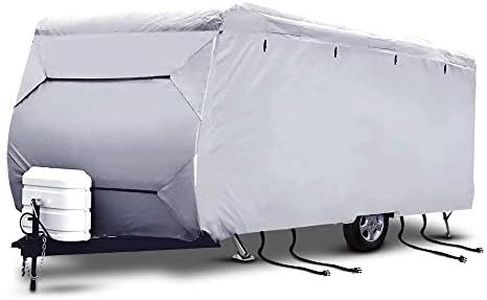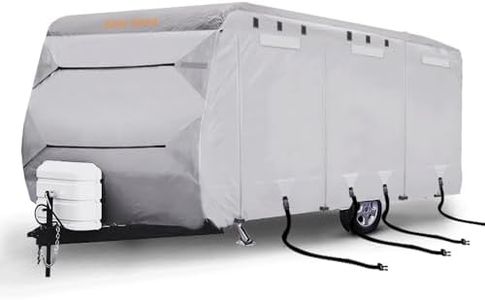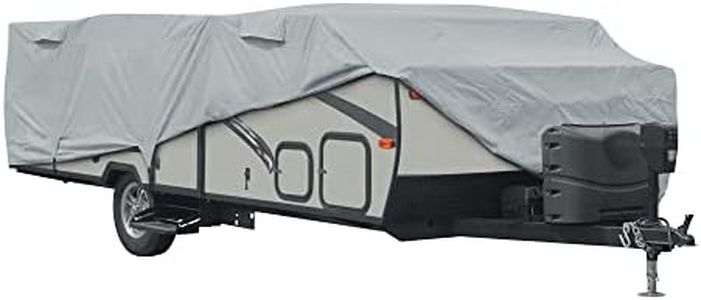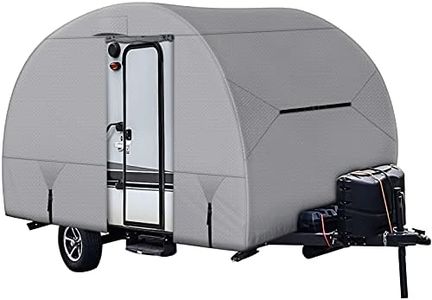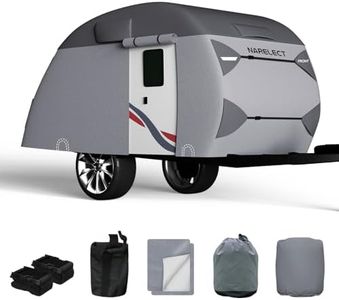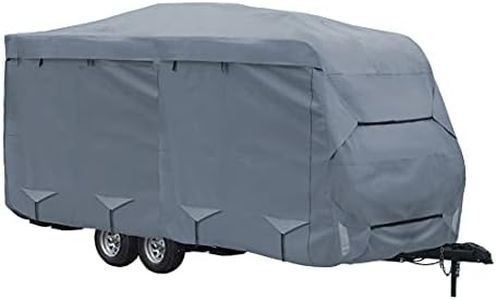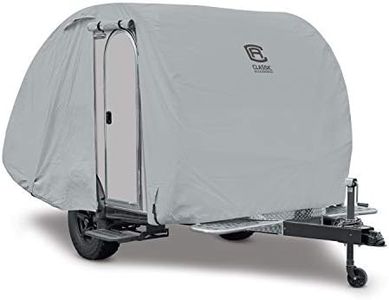We Use CookiesWe use cookies to enhance the security, performance,
functionality and for analytical and promotional activities. By continuing to browse this site you
are agreeing to our privacy policy
10 Best Travel Trailer Covers
From leading brands and best sellers available on the web.By clicking on a link to a third party's website, log data is shared with that third party.
Buying Guide for the Best Travel Trailer Covers
Choosing a travel trailer cover is a smart way to protect your trailer from the elements and keep it looking new for years. When selecting the best cover, it's important to think about your climate, how often you use your trailer, and where you’ll store it. A good trailer cover will shield your vehicle from sun, rain, snow, bird droppings, and dust, which prevents damage and reduces cleaning and maintenance time. The right choice will fit well, last a long time, and be easy to put on and remove.MaterialThe material of a travel trailer cover determines how well it can protect your trailer from weather, UV light, mold, and abrasions. Common materials include polyester, polypropylene, and sometimes vinyl. Lightweight materials like polypropylene are generally easier to handle and store, but may not provide the best protection in harsh conditions. Heavier materials such as polyester or multi-layered fabrics offer greater strength and better resistance against water and UV rays—but can be bulkier and a bit harder to put on. If you live in a milder area and want an easy-to-use cover, lighter materials are fine. However, for intense sun, frequent rain, or snowy conditions, prioritize durability with heavier, multi-layered materials.
Fit and SizeProper fit is crucial in keeping out water and debris, and in preventing wind from causing the cover to flap or tear. Covers are available in specific lengths and widths, often based on standard trailer measurements. Some come with adjustable straps or elastic hems for a snug fit. If your cover is too loose, it may billow or let in water; if it's too tight, it may be hard to put on or rip over time. Always measure your trailer end-to-end, including ladders and bumpers, to get the right size. Choose a cover designed for your trailer type (travel trailer, fifth wheel, etc.) for the best fit and protection.
Water ResistanceWater resistance determines whether the cover can protect your trailer from rain and melting snow. Some covers are water-resistant (repel water but may let moisture in over time) while others are fully waterproof. However, all covers should allow some breathability to let out trapped moisture and avoid mold or mildew growth. If you’re storing your trailer outdoors in a rainy or snowy region, prioritize high water resistance or waterproof features, but also look for covers with breathable panels or vents.
UV ProtectionUV protection prevents sun damage, which can cause fading, cracking, and deterioration of your trailer's exterior and roof. Not all materials block UV rays equally well—look for this feature specifically if your trailer will be exposed to a lot of direct sunlight. Covers with multiple or thicker layers usually provide superior UV blocking. If you live in a sunny climate or your trailer will be parked outside for long periods, strong UV protection is particularly important.
VentilationVentilation helps prevent heat and moisture buildup under the cover, which can otherwise lead to mold, mildew, or rust. Many specially designed trailer covers include built-in vents to allow air circulation. If humidity is an issue where you live, or if you'll be covering your trailer for a long time, make sure your cover features effective ventilation to keep the trailer dry and fresh.
Ease of UseThe ease of putting the cover on and taking it off is important, especially if you use your trailer frequently. Features like zippered panels, handles, and clear labeling can make handling the cover much simpler. Covers that are lighter and have elastic or adjustable features will generally be easier to maneuver. If you’ll be removing and re-installing the cover regularly, or if you work alone, consider this aspect closely.
Access FeaturesSome covers include zippered doors or access panels that let you reach parts of your trailer without removing the entire cover. This is helpful if you need to enter the trailer for maintenance or to retrieve items while it’s in storage. If you anticipate needing access while the trailer is covered, look for a design that matches your trailer’s door and window placement.
